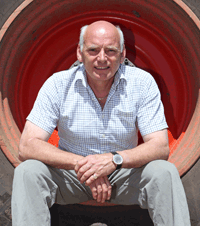FW Awards 2009: Contractor of the Year finalist – Charlie Baker

Being able to spot an opportunity and having the courage to follow it through is just two of the qualities that lies behind the success of Charlie Baker’s contracting business.
Charlie started contracting in 1974, after realising that relief milking lacked a long-term future. Stacking bales for local hay and straw merchants led to a hedge-cutting round, then to muckspreading and by working alongside local contractors he built up the business until in 1978 he formed a limited company.
By the mid-1990s, two silage teams covered nearly 2830ha (7000 acres) of grass and 1215ha (3000 acres) of maize, as well as an expanding arable portfolio. But huge change was on the horizon. In 18 months, after the milk price collapse, his dairy farming customers went from 46 to just seven.
“It took quite a bit of restructuring, both for us and the dairy farmers that remained,” he says. Adapting to change is Charlie’s forte, and seeing a niche, he restructured his business to encompass more arable land and developed a comprehensive range of services for those who remained in milk production.
Charlie now farms upwards of 1200ha (3000 acres) stubble-to-stubble arable on a profit-sharing basis, having taken on extra land this year as well as cutting 2000ha (5000 acres) of grass and maize silage.
Profit-sharing is something he’d increasingly like to see play a part on the dairy side, but he admits is won’t be so easy. “On an arable system it’s easier to define, but there are so many variables in dairying. We’re looking at coming up with something perhaps along the lines of margin over purchased feeds, as we carry out everything bar milking on most larger units.”
Charlie’s two sons, Christopher and Steven, play a large part in the day-to-day running of the business. “Having them dealing with a lot of the everyday management means I can concentrate on how to take the business forward and look for new opportunities.”
This year, to keep up with increasingly strict NVZ legislation, he imported a Kaweco slurry injector coupled with a Claas Xerion, the first in the country. All machinery is covered under service contracts, something he’s negotiated with each manufacturer, as it’s unusual on pieces of machinery other than foragers and combines.
Keeping up with the latest legislation is fundamental and mailshots, leaflets and the company’s website are all methods which are used to get information out. “We’ve compiled spreadsheets for all our dairy customers showing them what the new NVZ legislation means, how to tackle storage problems and how much they could save in terms of artificial fertiliser using the Kaweco system.”
A long-standing relationship with Claas has also resulted in his Jaguar 940 being the first to be fitted with the Telematics system, among many such firsts over the years.
“Staff enjoy the involvement of working with manufacturers, it gives them more interest in what sometimes can be mundane day-to-day work.”
About 20% of the business’ turnover comes from waste handling, including spreading coffee waste from the Kraft factory in nearby Banbury, operating the Agricycle business, which removes plastic from farms totalling 20,250ha (50,000 acres), and also spreading sludge cake for Thames Water.
He’s also won the contract to spread all the digestate and to grow and provide maize for a new anaerobic digestion plant north of Oxford, due to come into operation next year.
Another area of potential lies in his ongoing collaboration with the RSPB. Buying a specialist high capacity ditcher for wetland conservation has proved to be a particularly astute move, now accounting for almost 10% of income.
“You’ve got to keep looking for things to distinguish your business, and take the opportunities you are offered.”
Farm facts:
- Work undertaken: 2000ha (5000 acres) grass and maize silage, 1200ha (3000 acres) stubble-to-stubble arable contracting, slurry injection, food waste handling, digestate spread from anaerobic digester plant, spreading coffee waste and sludge cake. Agri-plastic recycling, RSPB wetlands management.
- Machinery fleet: Tractors – three Claas Xerion 3800, two Claas Arion 640s, Claas Arion 697, JD 7920, JD 6930, Claas Jaguar 940,Claas Lexion 580 TT, Claas Scorpion loader, Volvo loading shovel, Bateman RB26, Kaweco slurry spreader
- Labour: Charlie, his two sons, Christopher and Steven, three other full-time plus up to six part-time.
What the judges liked:
- Forward-looking and willing to take risks
- Family-run business employing local staff
- Commitment to investing in the latest technology
- Strong staff ethic, providing training and giving involvement
- Environmental conscience through involvement with waste management and RSPB
- More on the Farmers Weekly Awards 2009
- Meet the finalists

